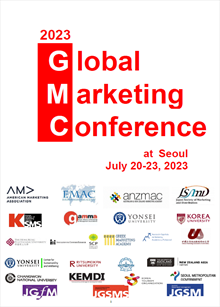간행물
Global Marketing Conference

- 발행기관 글로벌지식마케팅경영학회
- 자료유형 학술대회
- 간기 부정기
- ISSN 1976-8699 (Print)
- 수록기간 2014 ~ 2025
- 주제분류 사회과학 > 경영학 사회과학 분류의 다른 간행물
- 십진분류KDC 325DDC 330
권호리스트/논문검색
2020 Global Marketing Conference at Seoul (2020년 11월) 372건
261.
2020.11
구독 인증기관 무료, 개인회원 유료
3,000원
262.
2020.11
구독 인증기관 무료, 개인회원 유료
The purpose of this study is to explore the value structure of sharing economy for consumers, and to construct a model of consumers' continuoususe intentionin the sharing economy. Firstly, based on the characteristics of sharing economy platform technology, this paper explores the composition of platform value (time adaptability, location adaptability, content accessibility) through qualitative analysis. Then through quantitative analysis, this paper explores the influence of platform value on consumers' perception of emotional value and economic value. Finally, on this basis, this paper studies the impact of consumer value of sharing economy on consumer behavior, and compares and analyzes the impact of consumer value of sharing economy on consumers under different product types. In short, this paper aims to study the value creation of sharing economy from the perspective of consumption value, and shape its future development direction.
5,200원
263.
2020.11
구독 인증기관·개인회원 무료
264.
2020.11
구독 인증기관 무료, 개인회원 유료
This study aimed to determine how the quality of a pavilion affects participating exhibitors at an overseas Trade Show and to suggest strategies for an organizer of pavilions to operate more effectively so as to increase exhibitors‟ positive outcomes. We constructed a research model and presented some hypotheses. To assess these hypotheses, questionnaires were distributed to exhibitors who had participated in a Korean pavilion at an international Trade Show. SPSS 26.0 software was used to analyze the data. First, the factors that determined the quality of a pavilion were analyzed to assess their effect on participant outcome. The only two factors that were found to influence the quality of a pavilion were the conditions of an exhibitor's booth and the support activities by the organizers. These had positive effects on participating exhibitors‟ outcomes and anticipated future behaviors. To increase the positive outcomes of exhibitors, various changes should be made to improve the conditions of exhibitors‟ booths. The pavilion organizer should also develop other ways to increase the positive outcomes of exhibitors such as local advertising and promotional activities, on-site support activities, invitations to buyers‟ luncheons, promotional catalogs for exhibitors, and activities to attract potential buyers.
5,200원
265.
2020.11
구독 인증기관·개인회원 무료
266.
2020.11
구독 인증기관·개인회원 무료
267.
2020.11
구독 인증기관·개인회원 무료
Markets are complex ecosystems consisting of various interconnected actors, in which resources are integrated to co-create value. Said value co-creation within markets can be enhanced by creating higher resource density, hence shaping the market. However, market shaping research predominantly focuses on the activities of market shapers, rather than the equally important roles of other market actors within the ecosystem. While market shapers are instrumental in the process of shaping, this narrow focus fails to consider how all market actors inevitably are influenced or influence the market ecosystem. All market actors exert effort in the value co-creation process, including the process of market shaping. This study therefore explores effort in a market shaping context and examines the effects of effort reduction as a mechanism to facilitate market shaping as it leads to enhanced value creation. This is a conceptual study that uses theory adaptation approach to link the concept of value co-creation, market shaping, and effort. This study offers a conceptual framework and five propositions outlining the role of effort reduction in the value co-creation process with flow on effects to market shaping. The developed conceptual framework indicates how market shapers can enhance resource density and increase value creation by reducing the effort required of other market actors in the value co-creation process. This research offers effort reduction in the value co-creation process as a viable market shaping tactic and extends the focus beyond the focal market shaper to consider the broader context with numerous market actors within it.
268.
2020.11
구독 인증기관 무료, 개인회원 유료
In the ongoing project, the major building technology companies in Finland are joining forces to research and develop a platform based ecosystem in the intelligent building context. From the business perspective, one of the main question is which kind of business model is needed in the future ecosystem. Keywords: smart buildings; platform economy; ecosystem; business model innovations
3,000원
269.
2020.11
구독 인증기관·개인회원 무료
270.
2020.11
구독 인증기관·개인회원 무료
271.
2020.11
구독 인증기관·개인회원 무료
272.
2020.11
구독 인증기관 무료, 개인회원 유료
3,000원
273.
2020.11
구독 인증기관 무료, 개인회원 유료
3,000원
274.
2020.11
구독 인증기관 무료, 개인회원 유료
4,000원
275.
2020.11
구독 인증기관·개인회원 무료
276.
2020.11
구독 인증기관 무료, 개인회원 유료
This study enrolled enterprise business owners/managers in the U.S. as the subjects to investigate the relationship among four factors: personal motivation, the social expectation of stakeholders, business performance, and their CSR toward the local community. The research results showed that: (1) small enterprise’s perceived expectation from stakeholders has a positive effect on their decision to engage in CSR toward community; (2) their perception of business performance has a positive effect on their decision to engage in CSR toward the community. Based on these research results, public policymakers or relevant units are advised to further achieve the goal of nurturing a flourishing community by increasing awareness of stakeholder’s expectations for small enterprise’s CSR commitment. Also, it is clearly pronounced in this study that regardless of their personal motivation to support the local community, unless financially successful, small businesses are less likely to engage in CSR toward the local community. This result makes a good sense that having a successful business operation is a necessary condition for small enterprises to pay attention to a higher-level value such as CSR toward the local community.
4,000원
277.
2020.11
구독 인증기관·개인회원 무료
278.
2020.11
구독 인증기관·개인회원 무료
279.
2020.11
구독 인증기관·개인회원 무료

